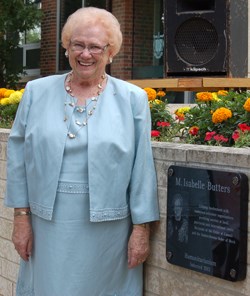Weyburn's Walk of Fame received three new inductees on August 2. Isabelle Butters, Dr. Noel Hall and Arthur Mainil are officially permanently recognized on the designated wall in front of City Hall.
A large crowd gathered in the sunshine to watch as the Walk of Fame Committee unveiled the plaques and the lives of each inductee were celebrated in stories told by their loved ones.
To kick off the ceremony, Mayor Debra Button congratulated the inductees.
"This is another proud day for our community, as we once again add the names of some very impressive individuals to a growing list of our sons and daughters who have demonstrated some significant accomplishments," said Button. "As a community, we are so honoured to call each of them one of our own."
Isabelle Butters, who was the first female Mayor of Weyburn, was honoured as a humanitarian. She has had lifelong involvement with numerous volunteer organizations, providing service at local, provincial and international levels. She is also a recipient of the Order of Canada and the Saskatchewan Order of Merit.
Dr. Noel Hall, who was known for being instrumental in a number of federal labour disputes, was recognized for his academic achievements. Dr. Hall had a number of degrees, including a Doctorate in Philosophy from Harvard University.
Arthur Mainil, who was one of the founding members of the Weyburn Inland Terminal, was inducted in the agriculture category. He was known for his love of freedom for farmers, for his strength of character and his unshakable determination to create a farmer-owned grain terminal.
Friends and family of the recipients spoke at the event, for which the only inductee able to be present was Isabelle Butters. Unfortunately, Arthur Mainil passed away nearly two years ago, and Dr. Hall's current health challenges prohibited him from traveling to Weyburn for the induction ceremony.
Butters' sister Wilma Oliver, who travelled from Manitoba to attend the event, joked that she had told one of her friends that she was going to Weyburn because her sister was 'being hung'.
"I had added that it was her generous nature and big heart that got her a place of honour on this famous wall," said Oliver, "and what a beautiful wall it is. It's a nice way to honour the people who have done so much for your community."
She commended the founders of Weyburn, whose dedication to their vision of the city has made it what it is today.
"What a beautiful city this has become," she said. "To accomplish that, it takes vision, leadership and energy. Well, Weyburn has Isabelle. Isabelle is like the energizer battery - she just keeps going. She's the envy of all her sisters. She has engineered, initiated and chaired too many things to be itemized. When I hear there is something going on in Weyburn, I don't even ask. I know Isabelle will be involved."
Dr. Jim McGillivray spoke on behalf of Dr. Noel Hall.
"Noel Hall grew up in Weyburn," explained Dr. McGillivray. "He was very well taught... he did well in school, he supported himself and did his share for the family."
In 1948, Hall left Weyburn to attend the University of British Columbia in Vancouver, where he got his Bachelor of Arts. Then he attended the University of California for his Master of Arts, and twelve years after leaving Weyburn, he earned his PhD.
"For a boy from Weyburn to have a PhD from Harvard is a remarkable achievement," he said. "For somebody to leave Weyburn and be the Dean of a university faculty in just 25 years is again another prestigious and important accomplishment."
Dr. Hall mediated postal disputes, railway strikes, and more of which there were plenty throughout the 1960s, 1970s and 1980s.
"He did a lot in labour relations to obtain peace and productivity for the Canadian economy," he said. "It's an honour to Weyburn that he came from our beginnings, our schools, our Collegiate."
Darwin Lackey spoke on behalf of the late Art Mainil.
"Art was always interested in making improvements to the farming industry," said Lackey. "He travelled and investigated many facilities for handling grain, and determined that Weyburn should have a grain terminal. Under his leadership and with the help and interest of many others, an inland terminal was built in Weyburn. It was the first inland grain terminal in Canada. It put Weyburn on the map, nationally and internationally. It changed the handling and marketing of grain to the benefit of us all. Weyburn is proud of that, I think, and we can thank Art as the one that helped make it happen."
Kara Cubbon, Mainil's eldest daughter, also spoke about her father. She emphasized her father's 'indomitable' nature in defending the rights of farmers to the Canadian Wheat Board.
"He felt the whole grain industry had a terrible attitude and no future," she explained. "So what happened next was impressive. A bunch of southeastern Saskatchewan farmers took it into their own hands to make changes."
The event was followed by a Centennial Tea at the Legion Hall, which was hosted by Quota International of Weyburn.



